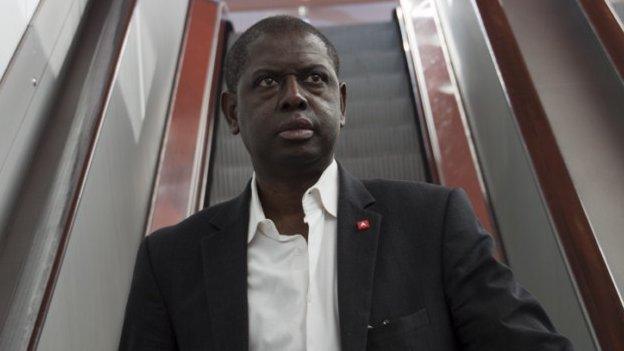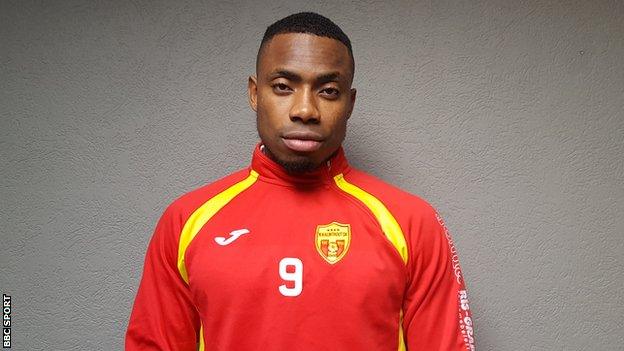Ex-player Paul Beloy says racism is still an issue in Belgium
- Published

Paul Beloy says there is still a problem with racism in Belgium
Paul Beloy, one of the first black players to feature in the Belgian league, says racism is still a problem in the country - despite Belgium's national team boasting players from a wide range of different backgrounds including Morocco, Kenya, DR Congo and Indonesia.
Beloy moved to Belgium from what was then Zaire now DR Congo as a young boy, and says he had bananas thrown at him in his early football career.
He says racism is still an issue at varying levels in Belgian football.
"In Mechelen, I was the first black person," he told BBC Sport.
"People came to our garden to look at the young black kids as they told each other: 'Their parents live in Africa and still live in the trees.' We were a novelty, a curiosity" said Beloy.
The 59-year-old claims the abuse continued into his playing career and in April 1978 during a game between his Beerschot VAC side and Antwerp, a banana was thrown at him from the stands.
"I picked up that banana and put it aside to continue playing," he continued.
"The next day the newspaper published a cartoon, depicting 'Beloy' with a banana skin. But that was the only reaction, that was it, full stop."
Beloy believes not much has changed over the years especially for youngsters. He currently works with a club in Antwerp whose youth teams are predominantly made up of immigrants.
"Everywhere they go, they face racism - it's the black team playing against the white team - but these kids are just six, seven or eight years old," he says.
"At youth level, matches shouldn't be competitive. That's what Club Brugge do.
"Alternative solutions to combat the problem would be time outs or a centralised hotline for complaints."
Beloy also feels that even at senior level there are issues.
"Beveren were a team entirely made up of Ivorians,, external who cost Beveren nothing and they sold them on to the biggest clubs in the world," he points out.
"For me that was pure human trafficking, another form of racism."
It seems that there are still problems in the lower leagues too according to Anthony Mbachu, a striker of Nigerian origin, who plays for amateur side Kalmthout.

Anthony Mbachu, a striker of Nigerian origin, claims he suffered racist abuse in Belgian football.
He highlights abuse he suffered while playing against Maria-ter-Heide.
"The assistant coach [Patrick] Supilie began to shout - 'it is always the same with you, banana head' - all kinds of racial slurs were hurled my way," said Mbachu.
Supilie later apologised for his comments after the Kalmthout players walked off in protest.
The Belgium Football Association (KBVB) awarded the match to Maria-ter-Heide because the game had to be abandoned.
However Maria-ter-Heide were eventually sanctioned with a three-point deduction for racism.
"I played with Christian Benteke at Standard Liège at youth level and I never encountered a problem then," Mbachu continued.
"It all changed when I went to the provincial level. Opposing defenders often say 'go back to your country.'
"Why? I don't understand. I swallow it, but privately it destroys me."
Crystal Palace striker Benteke was born in the DR Congo capital Kinshasa and was one of ten players with African ancestry who featured in November's Belgian squad for a friendly against the Netherlands and a World Cup qualifier against Estonia.
"The Red Devils are the standout example of how a multicultural society can function," said Frank Van Laeken, who co-authored a book on racism in Belgian football with Beloy.
"They are a mix of traditional Belgians and 'new' Belgians, all working together at the top but it's an exception, you don't find that mix of colours and different backgrounds anywhere else in society."
Beloy believes one of the problems is that the football association has been left to deal with the issue of racism.
"One of the problems is that Belgium doesn't have a federal minister of sport," he explained.
"The FA is responsible for the national team and the amateur leagues, the Pro League for the professional club game, but the Belgian system is too fragmented to monitor racism," highlighted Beloy.
The KBVB says that it receives about 25 complaints about racism a year.
"We can't hide behind the Red Devils. Every case of racism is a case too many. It's totally unacceptable," said Belgian FA president François De Keersmaecker.
"We focus on three issues: regulation, repression and prevention.
"To end racism is difficult, but it is paramount that at youth level, in clubs, in schools and in work shops, we act. Young people understand the problem better than the older generation."